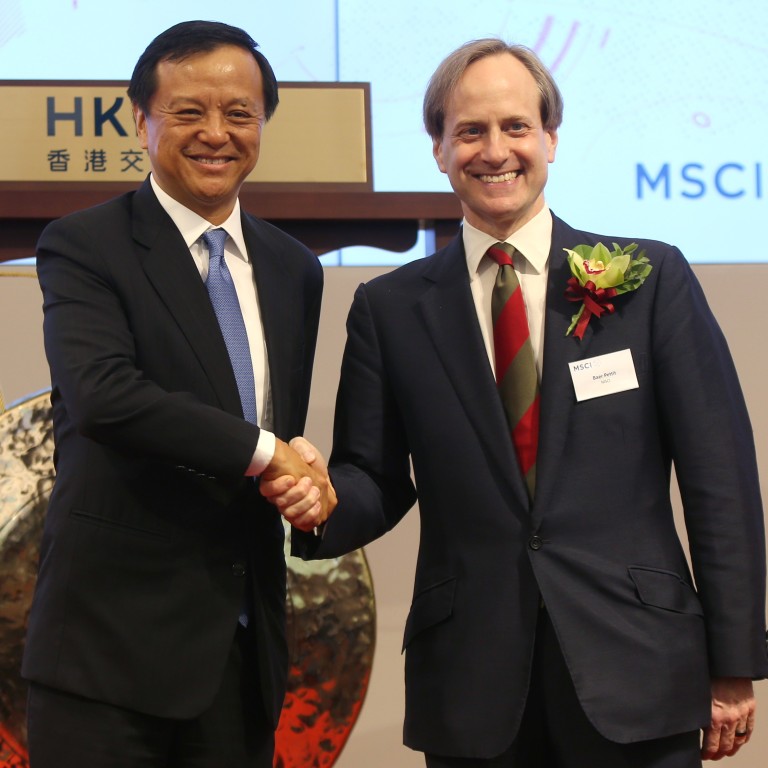
China’s A-share market reforms have begun and investor interest is growing, so get ready to catch the wave
- China has work to do to earn international investors’ trust and produce greater returns, but its size and the interest it already generates suggest it will shake the world over the next decade
China has the world’s second-largest stock market but foreign ownership amounts to less than 3.5 per cent. Usually, when Hong Kong and foreign investors talk Chinese stocks, they’re not referring to those on the Shanghai and Shenzhen stock exchanges, but companies listed outside the mainland – primarily Hong Kong and New York.
For decades, investors in Hong Kong and overseas were kept away from the onshore market, known as the “A” share market, by foreign exchange controls, regulatory hurdles and worries about mainland corporate-governance standards.
But recently, an internationalisation process began that should raise foreign ownership of A shares to the 15-20 per cent level in the next 10-15 years.
This market ranks No 2 globally and No 1 in Asia in terms of market capitalisation (about US$7.6 trillion) and volume of trading, with daily turnover typically six to eight times Hong Kong’s. China is projected to become the world’s largest economy by 2030 to 2035, offering attractive investment opportunities, particularly in companies listed domestically that specialise in the digital economy, consumer products, health care, education and travel.
Traders seeking to hedge against exposure to A shares should also soon have new tools to do so. Hong Kong has said it is thinking of offering MSCI A-share contracts on its futures exchange.
Chinese authorities have also responded to concerns about corporate governance and regulation. In mid-2015 1,422 companies, about 30 per cent of the Shanghai and Shenzhen exchanges, responded to falling prices by suspending trading. Chinese regulators now seldom permit suspensions, and currently only 11 stocks are suspended (for legitimate reasons). Standards of reporting and fair pricing are gradually moving towards the international norm.

China needs to improve how its capital markets work, and the participation of foreign institutional investors can help. The country’s long-standing trade surpluses are projected to turn into a deficit, which means the country needs to import foreign capital.
And Beijing knows it has to reduce waste of capital on the mainland. The current system of capital allocation depends heavily on bank lending, which can end with loans allocated to less efficient, even poorly qualified users, but the government has announced a significant policy decision to encourage the private sector and small businesses, and the country badly needs a system that allows better financing decisions based on market forces.
The stock market can be a good alternative to banks, provided it works effectively. Improvements can be driven by both domestic and foreign institutional investors, equipped with fundamental research and professional practices. Right now the markets in Shanghai and Shenzhen can only meet China’s capital-allocation requirements to an extent, as it is a market dominated by short-term traders. About 80 per cent of trading activity is carried out by small investors, who tend to be short-term and trend followers.
Clearly, opening up the capital market now serves the interests of both China and foreign investors. It also brings immense benefit to Hong Kong.
The Chinese market has some catching up to do. Over the past 10 years, in terms of US dollars, A shares have returned a total of about 30 per cent, compared to New York’s return of 220 per cent over the same period. The catching-up process may already have started, with the A shares gaining 22 per cent so far this year, ahead of New York’s 13 per cent over the same period. Indeed, China’s domestic market is the world’s best-performing major market year-to-date, despite recent difficulties in trade negotiations.
We can expect a wave of buying over the next 10-15 years. If participation reaches the US stock market level, foreign ownership of A shares should stabilise at around the 15 per cent level. If it reaches the level of countries in East and Southeast Asia, we should be looking at around 20-35 per cent.
Not since the world rushed into Japanese stocks half a century ago have we seen a globalisation process for a domestic market of such size and importance.
Cheah Cheng Hye is the co-chairman and co-chief investment officer of Value Partners Group Ltd, an asset management firm in Hong Kong, and also serves on the board of Hong Kong Exchanges and Clearing Ltd as an independent non-executive director. The views expressed here are his personal views

